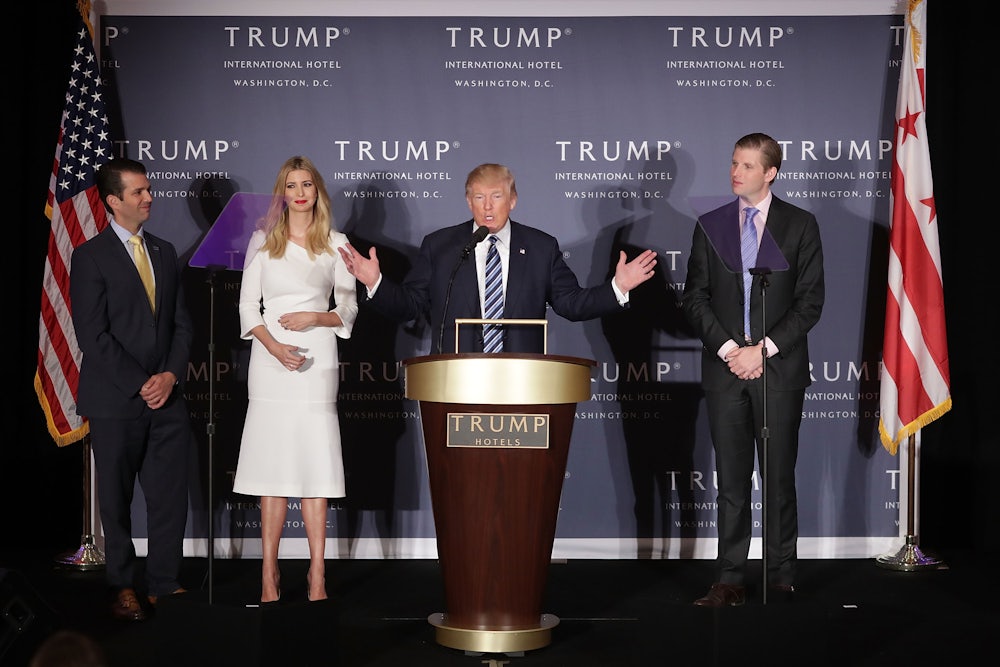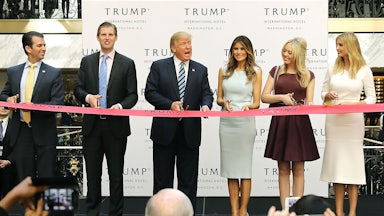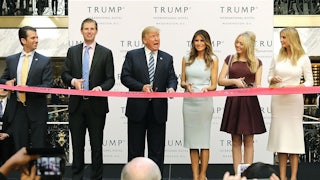Former President Donald Trump defrauded banks, insurers, and tax agencies out of at least a quarter-billion dollars over roughly the last decade, the New York attorney general’s office said on Wednesday. That totaling came as part of a lawsuit filed against Trump and his family real estate business, the Trump Organization, that sought to recoup those illicit profits and ban Trump and his top lieutenants from running a company in New York ever again.
“With the help of his children and senior executives at the Trump Organization, Donald Trump falsely inflated his net worth by billions of dollars to unjustly enrich himself and cheat the system,” New York Attorney General Letitia James said, in a statement on Wednesday. “In fact, the very foundation of his purported net worth is rooted in incredible fraud and illegality. Mr. Trump thought he could get away with the art of the steal, but today, that conduct ends.”
Trump, through a spokesperson, denied any wrongdoing and accused James of unspecified misconduct. “Today’s filing is neither focused on the facts nor the law—rather, it is solely focused on advancing the attorney general’s political agenda,” Alina Habba, a Trump attorney, said in a statement. “It is abundantly clear that the attorney general’s office has exceeded its statutory authority by prying into transactions where absolutely no wrongdoing has taken place. We are confident that our judicial system will not stand for this unchecked abuse of authority, and we look forward to defending our client against each and every one of the attorney general’s meritless claims.”
The civil lawsuit does not put the former president at risk for prison time or a criminal conviction on its own, setting it apart from some of Trump’s other legal morasses across the country. But it could prove to be destructive to his business empire. If James’s lawsuit succeeds, Trump and his three eldest children—Donald Jr., Ivanka, and Eric—could lose control of the company and be barred from regaining it in the future. Paying any fines or penalties, which the attorney general’s office estimated as at least $250 million, could require the Trump Organization to sell off major assets.
James does not have the power to criminally prosecute Trump for the alleged violations of state law, though she referred her findings to federal prosecutors in Manhattan and to the IRS to determine whether he broke any federal laws. Her findings will also likely raise new questions for Manhattan District Attorney Alvin Bragg, who declined to pursue further charges against Trump on the same matter earlier this year. Two prosecutors later resigned over that decision.
In the 222-page lawsuit, James lays out how the Trump Organization created billions of dollars of value for its various properties out of thin air. The company and its top lieutenants are described as defying basic accounting practices, avoiding independent valuations, and pressuring appraisers to highball or lowball their estimates, depending on whether the result would be more favorable to the Trump Organization at the time.
Perhaps the most fitting example is Trump’s varying valuations of his triplex apartment at Trump Tower in New York City. For years, Trump and his company claimed that the roughly 30,000-square-foot unit was valued at around $180 million, which would have made it the most expensive unit in Manhattan—a place where apartment units don’t exactly go for cheap. There was only one hitch: The unit itself was only about a third of that size, making what was already a gross overestimate by market standards into an inconceivable one. Trump used the higher valuation to obtain better homeowner’s insurance until 2017, when Forbes magazine publicly reported the lower footprint.
Trump’s Mar-a-Lago resort in Florida saw similar feats of accounting acrobatics. When Trump purchased the property, it came with a variety of land-use restrictions, zoning requirements, and conservation standards. This meant that, among other things, he could not simply parcel it out into smaller residential properties. Before his own ascent to the presidency, Trump and his company also noted that it was deemed unsuitable for other hoped-for uses, including as a formal retreat for government officials.
None of those restrictions, however, made their way into the valuations of the properties. “The Mar-a-Lago club was valued as high as $739 million based on the false premise that it was unrestricted property and could be developed and sold for residential use, even though Mr. Trump himself signed deeds donating his residential development rights and sharply restricting changes to the property,” the New York attorney general’s office said in its filing. “In reality, the club generated annual revenues of less than $25 million and should have been valued at closer to $75 million.”
This is a bit like pricing a midsize sedan above its Kelley Blue Book value when it can’t go in reverse, and then claiming it could also be used to resupply the International Space Station. Since those valuations mostly preceded Trump’s presidency, they also did not include the troves of classified material he apparently, until recently, stored on the site once he left the White House in 2021. The dodgy estimates also place his occasional efforts to host international gatherings, including the G-7 summit, while president in a new light.
In one remarkable part of the lawsuit, the attorney general’s office described an effort by Trump to justify the valuation of his 40 Wall Street property, whose assessment was—you guessed it—somewhat inflated. In one instance, Trump and his lieutenants pushed back against concerns raised by the bank Capital One, which questioned in 2009 whether the cash flow of the property could justify the $160 million mortgage they had given the Trump Organization to acquire it.
“At one of those meetings, Mr. Trump said that if the bank tried to restructure the loan because of a low loan-to-value based on a bank appraisal, he would counter a low appraisal by creating a Trump University lease for the vacant space and then order his own appraisal,” the lawsuit said. “According to Mr. Trump, the lease would ‘pump up’ the value and the net result would be either a third appraisal or some sort of arbitration or litigation.” Trump University ultimately shut down in 2016, as part of a $25 million settlement to resolve a multistate consumer fraud lawsuit, making the proposed scheme look something like an M.C. Escher painting where every staircase leads to fraud.
James already disclosed many of her findings earlier this year when she persuaded the federal courts not to quash her subpoena of Trump himself and his adult children who worked for the Trump Organization. (Neither Tiffany Trump nor Barron Trump, who were minors for most of the time period described in the lawsuit, is named in it.) Trump ultimately lost when the Supreme Court declined to intervene over the summer, and invoked the Fifth Amendment right against self-incrimination more than 450 times. The use of that right can’t be held against him in criminal trials. But the same does not necessarily hold true for civil proceedings, where judges and juries can generally draw adverse inferences from his refusal to answer questions.
Trump is no stranger to legal peril, and it is always possible that he will find a way to escape the most dire consequences in this case, as he has in others. But the James lawsuit is a uniquely potent threat to the former president. It is a state-level proceeding, meaning that Trump cannot simply make it go away if he reclaims the presidency in 2024. The case cannot be redirected before a friendly Trump-appointed federal judge, as Trump did in an attempt to hinder the Mar-a-Lago investigation in recent weeks. And there is little chance that New York officials answerable to the Empire State’s mostly Democratic electorate will bend things his way or intervene on his behalf.
In some ways, the stakes are even higher in this case than they are in the January 6 investigation or the Mar-a-Lago investigation or any other criminal investigations, known and unknown, that Trump faces. If the lawsuit prevails, even if no further criminal charges are filed, he could lose control of his family company and, with it, the principal basis of his personal wealth. He could see himself shut out of running any other company that operates in New York for the rest of his life. What’s more, his own children could also find themselves facing similar consequences for the rest of their lives.
Trump has not yet committed to running for president in 2024, even though it is all but assumed that he will. Wednesday’s lawsuit may make that decision inevitable now. If Trump perceives that his only chance of maintaining his lifestyle and wealth is to regain the presidency, he could be even more motivated to regain that office than ever before. His family’s fortunes may, quite literally, depend on it.










